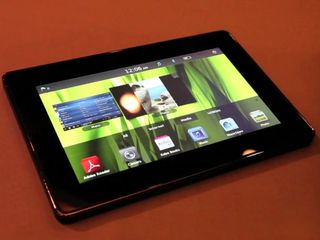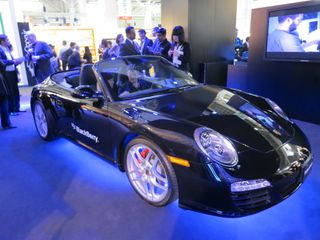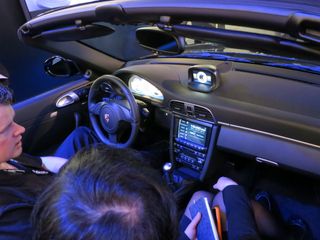
According to Steve Levy, CEO of enterprise mobile app platform company Verivo, BlackBerry is still viewed as the safest by IT professionals. However, there's been an increasing number of companies who are allowing employees to 'BYOD' or Bring your Own Device. If those running the IT department had their way, they would likely only support once device: the BlackBerry.
The problem is that those IT advocates really have no way to help push greater RIM adoption. Even though the company makes most of its revenue from smartphones, RIM did not announce anything new at MWC 2012, and there's going to be a lot of pressure from manufacturers like Nokia this year who are trying to reestablish their global position. The increasing volume of Android devices and Apple's stable position means RIM is likely only to fall behind.
Some of us expected RIM to unveil its new BlackBerry 10 smartphones, but now we know that's not going to happen until late 2012. Until then, the BlackBerry 7 lineup, which was released last year, is the only thing the company can hawk. On the tablet front, RIM is selling the PlayBook in many cases at prices less than half of the launch at $500. Unless something dramatically changes, the PlayBook line looks destined to go the way of the TouchPad.

The only thing noteworthy at RIM's MWC booth was the QNX-based Porsche Carrera 911 concept car. First demoed at CES, it's meant to demonstrate the capabilities of QNX and future automotive applications. Inside are three PlayBooks, one for navigation (center console), while the other two are mounted on the back seats as media players. All three devices are networked, so you can control the rear content from the center console.

For those not in the know, QNX is already used by brands like Porsche, Audi, and BMW. It's also is the basis for the PlayBook OS and the upcoming BlackBerry 10 OS. Unfortunately, this specific media-focused application of QNX is only a concept car. You can't actually walk into a dealership and get a Carrera 911 all decked out with the following features (source: Cnet):
- Voice recognition software that allows you to navigate to a location or open a Web site on your center console
- Voice calls in stereo sound via Bose speakers
- Video calling with PlayBook tablets in the back seat
- NFC tags to connect your smartphone and navigation system via BlackBerry Bridge
- Wireless 3G router in the dashboard provides Internet connectivity
Stay On the Cutting Edge: Get the Tom's Hardware Newsletter
Get Tom's Hardware's best news and in-depth reviews, straight to your inbox.
-
visa Tough sell for small-to-medium businesses that outsource their IT. Essentially, you can go out and buy either an Android or iPhone and connect it to Exchange (with possibly minor adjustments on the Exchange server) or pay your IT provider to install and configure BES. For larger corporations it makes sense, as long as you don't have to hear end users whining and complaining about not being able to use their iPhones.Reply -
zak_mckraken ReplyYou can't actually walk into a dealership and get a Carrera 911 all decked out with the following features.
Damn, I was just on my way there! -
aftcomet My contract is about to expire and my N95 8GB is still chugging away after so many years. I've gotten that phone soaked and dropped on concrete numerous times and it keeps coming back. I'm looking to buy a phone but I don't think the new line of Blackberries will be out before the end of the year so I don't know if it's worth waiting.Reply
See, the only thing I find appealing about a Blackberry to myself is the keyboard and BBM. As I use my phone for mostly Email, Messaging, Internet Browsing, and Calls, the Blackberry is appealing to me because it fits the bill the best. I absolutely love the small flashing light that tells you if you have any notifications. I hate having to turn the phone on to check.
But it's surprising how irrelevant RIM has become. Their phones are missing so many features it's very difficult to make it a good buy. Inferior hardware (CPU, GPU, RAM). Inferior camera, inferior screen. All it has going hardware-wise is a removable battery.
The device I think I'd want the most is a Windows Mobile one. But I hate being an early adopter of anything. I'll definitely buy a flagship Nokia device running WM8 after it's been through a couple of refreshes.
RIM looks destined to RIP. -
freggo 'rear seat' of a Porsche 911 ?Reply
It's a 2 seater... !
The read bench is barely large enough for a shopping bag :-)
-
mcd023 freggo'rear seat' of a Porsche 911 ?It's a 2 seater... !The read bench is barely large enough for a shopping bag :-)Reply
They were just wanting people to know who their friends are! -
Such a biased article! What about TAT? What about Playbook OS 2.0? Android Runtime? Cascades?Reply
Sure TAT's stuff is a concept, but it is exceptional. I haven't seen any other mobile device providing that.
What about the email with facebook and LinkedIn integration which easily makes it the best PIM system I have seen.
Crazy. Bias. -
DaveUK The biggest business growth area (certainly in the UK) for mobile telecommunications providers is actually in SOHO and Small/Medium business rather than corporate/enterprise. Therefore the statement that most IT pros prefer (or endorse on a safety level) Blackberry over other handsets is completely and utterly false.Reply
Actually, 'most' IT professionals are working in an environment where Blackberry handsets and/or server software are no longer viable due to the exploding adoption rate of iOS/Android devices and the fact that the decision makers that pay for the IT deployment in the first place covet these devices.
Tom's do seem to be stuck in a pre-iPhone and pre-Android time warp in these reports where they still refer to Blackberry as the go-to device for business and for IT professionals.
It is not. The corporate market and enterprise-level IT professionals (with organisations where the enhanced device security, control and manageability of BES are most relevant) are actually a very small piece of the pie and not indicative of the general situation at all. The majority of IT professionals outside of enterprise are looking at iOS/Android devices and how they can make these work best for their organisation.
The reality is that the fastest growth areas in business mobile telecommunications are becoming saturated with more mainstream devices that support the Exchange Activesync protocol natively - which is slowly but surely reducing demand for BESX and BES.
-
olaf i find blackberry's such a cumbersome device ... and yes as someone said it : hardware wise its obsolete...Reply
